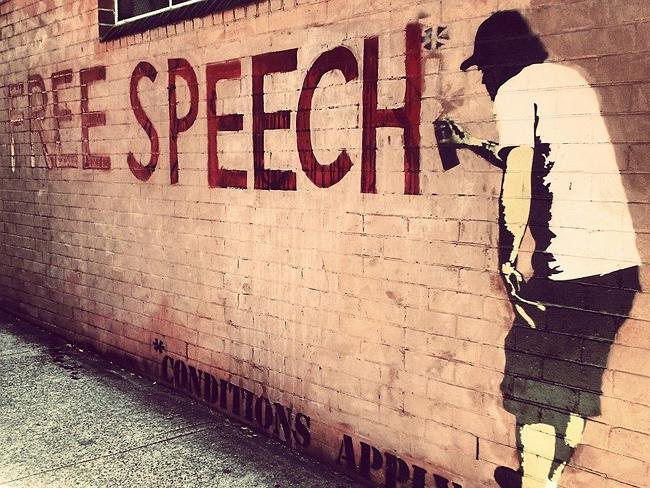You have no items in your cart. Want to get some nice things?
Go shopping
In Britain I would find it difficult to write something that would get me thrown in jail. Unlike a great deal of modern democratic countries, we Brits enjoy being able to write and express ourselves with almost no fear of any legal interference. This freedom and our boundary-pushing artistic expression has made Britain the great hub of culture that it is today. So, I ask myself, why, in a recent poll did 46 percent support the idea that legal limits should be placed on free speech concerning religion?
The poll asked people to choose whether they agreed more with the statement: people should be allowed to say what they want about religion, or: certain things should not be allowed to be said about religion. Being a writer myself, this desire for censorship was unsettling to say the least.
The most likely demographic to champion these limits turned out, perhaps surprisingly, to be young, liberal, self-proclaimed fans of a multicultural society. The motivation for their desire to limit free speech is, presumably, to bring society closer together. At first glance, their logic seems rational. Enforcing legal action against certain offensive things that are said would probably do quite a good job of curbing a lot of hateful speech against religious groups. But the loss of free expression would be a heavy price to pay.
I’m confident that a lot of the people polled do not actually want to limit free speech, but instead only want people to be more respectful of each other. A worthwhile cause to fight for, without a doubt. What they must realise, however, is that the problem is not with the words, or the saying of them, but rather with the hateful ignorance of the people behind them. Limiting free speech only opens the gates to more limits, which is throwing the baby out with the offensive bathwater. Effective social integration does not come from laws and restrictions, it comes from engagement, debate and less restriction on expression. Because with these things comes the free sharing of ideas and art, and the gradual replacement of bigotry and ignorance with mutual understanding.
It also seems important to ask ourselves: If something is deemed worthy of censorship today, who is to say that it will be tomorrow? We read things every day that would have mortally offended the morals of an average person one-hundred-years ago. Back then, one could still be imprisoned for blasphemy. It is a cause for celebration, surely, that we have advanced, and continue to. Obviously, we cannot base our morals on the future, but we can at least be aware that any blanket statements we make about what deserves to be censored today are not likely to be the final words on the topic. Where free speech is concerned one must be delicate, not definite, and think relatively, accepting the good with the bad. Ignoring that is to begin the slippery decline into moral absolutism and a society where we assume we’ve become the perfect versions of ourselves.
Perhaps the problem with the poll is that it is asking British people. With so much freedom ourselves, we are bound to think quite glibly about losing it. How far can we really fall? We all hear about things like the recent increase on the death fatwa bounty on Salman Rushdie by the Iranian regime, and the imprisonment of British author Alan Shadrake in Singapore back in 2010 for his written criticism of their use of the death penalty, and we think that that’s as close to home as these things get. So it’s all fine, because as long as we stay out of Singapore and don’t upset the Ayatollah, then we’re okay, right?
Well, no, not really. And the intricacies of free speech might seem a little more important to the public when things like the Snooper’s Charter (or the Draft Communications Data Bill), are pushed forward, allowing the government to not only snoop through whatever files or documents of ours that they please, but to be able to do so without reason for suspicion and without care for our privacy.
Surveillance of some sort is necessary, of course, because we all want to enjoy some safety precautions. But, (and I’m reminded of Christopher Hitchens when he said, regarding writing about his trip to North Korea: ‘I though they wouldn’t make me mention 1984, I just wouldn’t do it. But eventually they make you do it.’) an assumption of privacy is vital unless we want to descend into some sort of Orwellian, constantly-looking-over-your-shoulder nightmare.
So at a time when it seems more important than ever to debate the pros and cons of ideologies and ideas, and empower the kind of artistic expression that paves the way for a greater understanding of the world, it doesn’t help if the well-meaning public and questionable government bills are fighting against that. But maybe I’m fighting a losing battle. If we’re going that way, and going there democratically, perhaps it is time to practice my regime-praising songs and learn the style-guide our supreme leader has deemed appropriate for journalists and artists. The government is close to becoming an omnipresent deity, and, as if that wasn’t bad enough, they’ll be a god we can’t even talk about.

About Joshua King
Josh King is a British writer, currently studying a Creative Writing MFA in New York and living in Brooklyn. He writes for Texas' Newfound Journal and divides his time between fiction writing and commenting on the New York literary scene.




